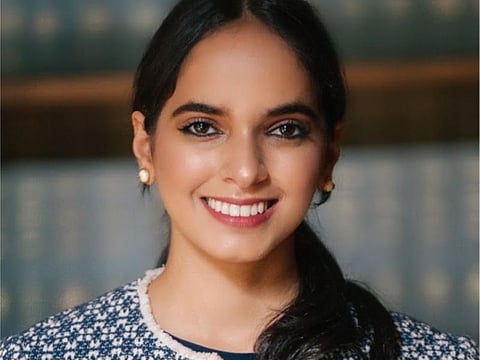Why UAE’s Dubai Abulhoul is a force to reckon with
Emirati author’s think tank offers platform for region to reclaim its narratives

Dubai: Author. Rhodes Scholar. Founder of the think tank Fiker Institute -- Dubai Abulhoul is all that and more. And she is only 25 years old.
Brimming with thought-provoking deconstructs, test ideas and dialogue triggers, the Emirati high-achiever is someone who can walk her talk.
Having studied diplomacy and global governance at the University of Oxford and political science and literature from NYU Abu Dhabi, she served at the Ministry of Foreign Affairs for two years, before she established her inter-disciplinary think tank in September last year. It was a response to what she believes is the need of the hour: To set the record straight about the region and debunk stereotypes about its people.
“From ever since we can remember, the world has had an opinion about the Middle East. It’s time now for the Middle East to express its opinion about the world,” she says in an exclusive interview with Gulf News.
Dubai, who is named after the city, feels strongly about the issue. “Our region has always been at the receiving end of a lecture by international counterparts; stereotypes about people being uneducated and oppressed have become a reference point for the region, but the basis of that is a purely western and colonial construct. It is not the reality that my peers and I grew up in,” she contends.
According to her, the negative portrayal of the region can be traced back to the year 1798, "when Napoleon first invaded Egypt, and commissioned creatives to present Arabs in a negative light". Regretfully, little has changed since then as biased perceptions continue, she noted.
Reclaiming the narrative
In was against this backdrop that Fiker – which finds its roots in ideas – was established as a platform to “reclaim narratives”, and give the region a say in tackling global challenges like gender equality, climate change, diplomacy and culture – all of which are distinct thematic programmes pursued by Fiker’s scholars. The institute also promotes cross-cultural and inclusive dialogue, and publishes non-Arab writers as well.
“We are tired of being the talking point. We want to do the talking too,” she says.
“Every time I participate in an international meeting, I can feel a sense of disappointment in some sections of society when they discover I am not an oppressed woman who needs to be saved,” she adds candidly.
But Dubai clarifies her statements. “I hesitate to say I speak on behalf of all people or nations in the region. And neither is Fiker agenda-driven. We are an open platform where cultural creatives can advance their own narratives. If someone disagrees with our views, we welcome their counter-opinion as well.”
Overwhelming response
The response to the initiative has been overwhelming. As Dubai recalls, “When Fiker was launched in September last year, we did not expect the announcement to go viral. We were flooded with messages from people who wanted their voices heard; we received requests from professionals in different fields, offering to volunteer with us and be part of this mission. It just went to show that our message resonated widely within the region.”
While on the subject, she adds, “We started a debate regarding the naming of our region itself, and the need to use a more geographically accurate term like West Asia and North Africa. The ‘Middle East’, which is a British colonial term, is witnessing unprecedented waves of change and transformation. International scholarship surrounding West Asia and North Africa has predominantly been shaped by orientalist frameworks, and has overlooked the region’s diverse social, political, economic, religious and cultural fabric.”
Nuances of local contexts
Fiker’s West Asia and North Africa programme, which is one of its three geographic programmes along with Europe and the Americas, aims to decolonise perceptions surrounding this region and advance scholarship that highlights the nuances of its local contexts, she notes.
So just how evolved is public discourse in the region? “I would say public discourse has developed in silos or specific streams. We would like these different streams to talk to each other and to the world. It cannot be an isolated effort, there needs to be more engagement,” says Dubai.
Publications by Fiker’s resident and guest scholars and writers cover a wide range of issues: From post-pandemic diplomacy, border control in Europe and polarisation in American politics to reflections from the UAE’s first humanitarian operations in Europe, why Italy built a cultural institute in Abu Dhabi and how Sharjah became the World Book Capital in 2019.
Dubai stresses the fact that Fiker is a platform for everyone. “We have an open call for writers, artists, creatives and others to submit their ideas, initiate cross-cultural dialogue, and not in the manner of the mainstream media’s breaking news, but instead breaking the news down.”
‘Unshakeable optimism’
Fiker’s research fellows, she points out, can undertake a six-month programme which provides them an opportunity to publish four research publications, sponsored by the institute. At the end of the programme, participants get a certification too.
Besides the geographic and thematic programmes undertaken by Fiker, the institute also advises public and private entities in the areas of international cooperation, policymaking and culture, through strategy development, risk assessments and evidence-based recommendations, says Dubai.
“Investing in a think tank requires unshakeable optimism, like any cultural endeavor,” she adds.
That she is already a force to reckon with speaks volumes for Fiker’s body of work so far.



